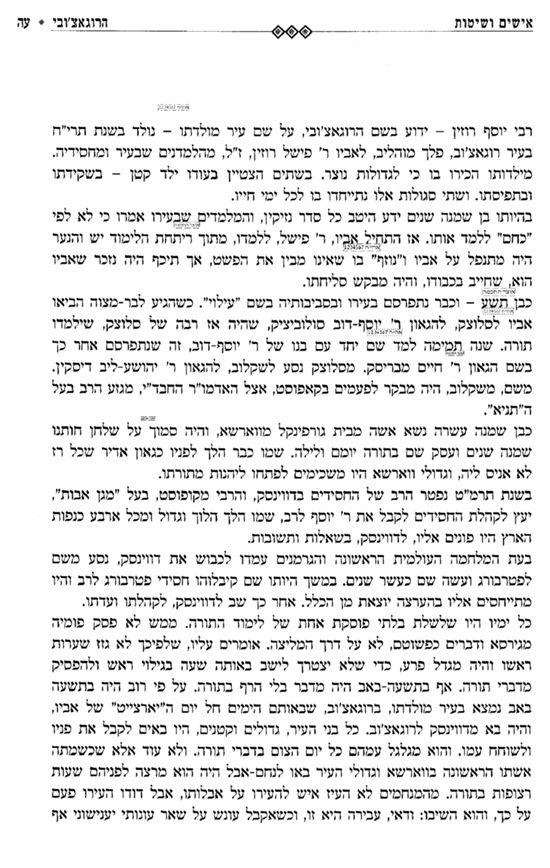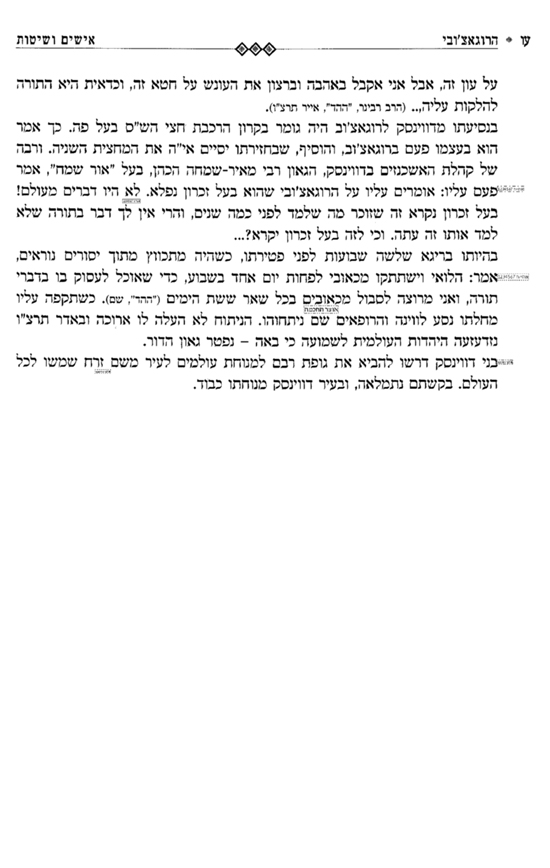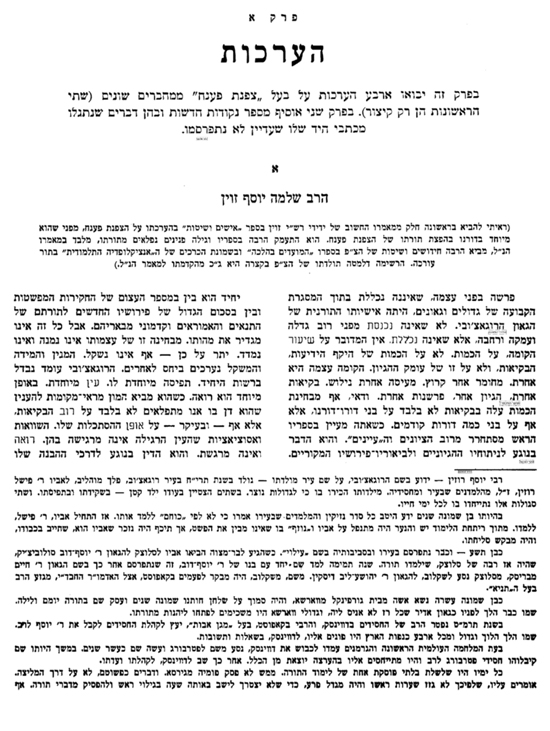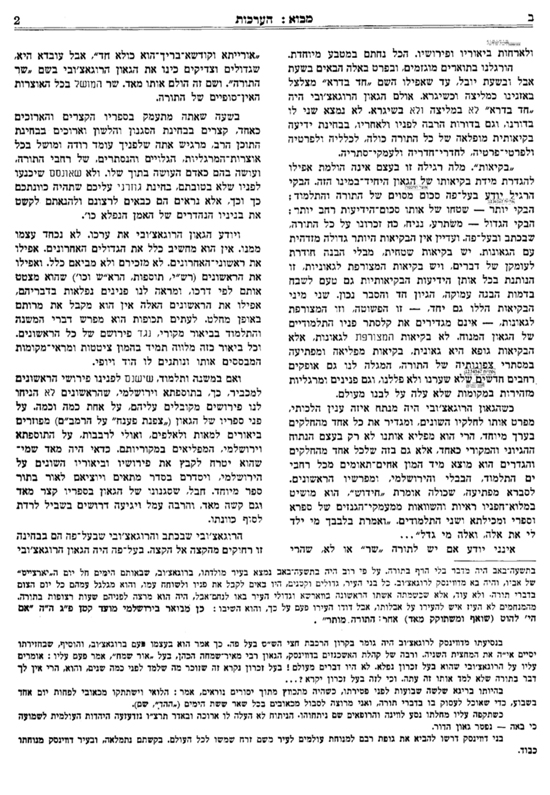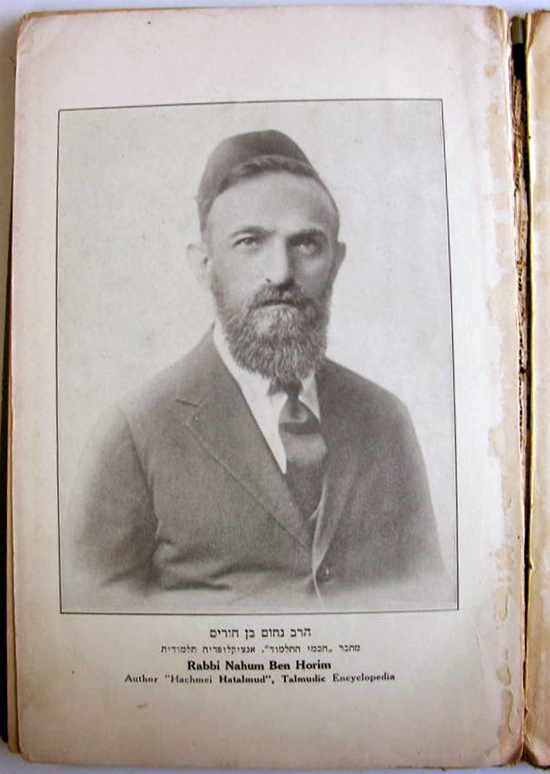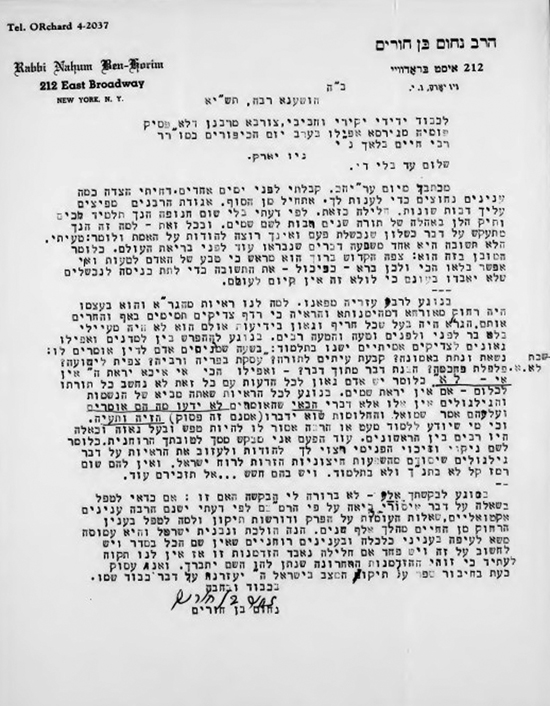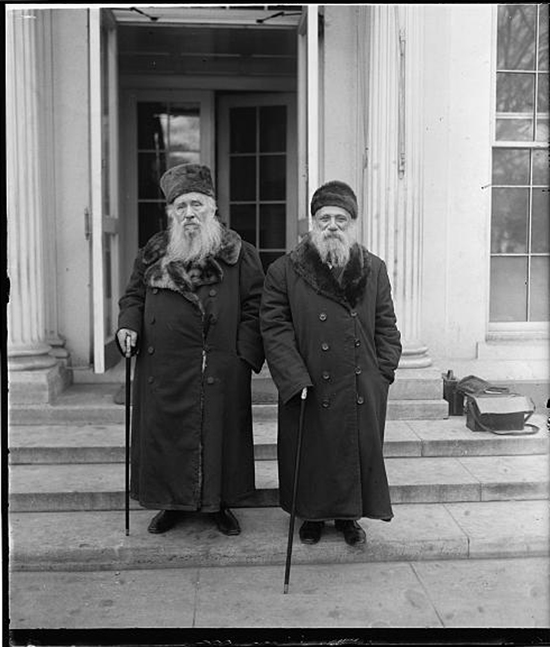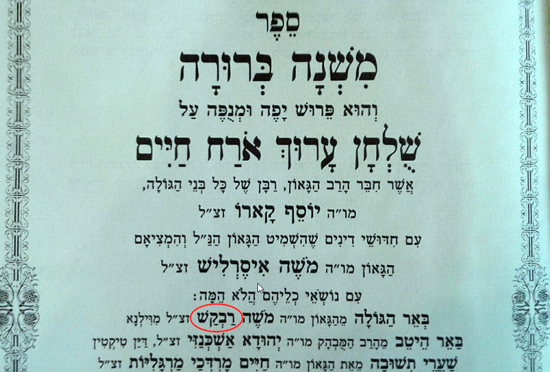The Rogochover and More
Marc B. Shapiro
In a recent
Jewish Review of Books (Summer 2017), I
published a translation of an interview R. Joseph Rozin, the Rogochover, gave to the New York Yiddish paper,
Der morgen zhurnal. You can see the original interview
here. The fact that the Rogochover agreed to the interview is itself significant. As is to be expected, the content of the interview is also of great interest.
In the preface to the interview, I mentioned that the Rogochover famously studied Torah on Tisha be-Av and when he was an avel, both of which are in violation of accepted halakhah. When he was once asked why, while sitting shiva, he learnt Torah, he is reported to have replied:[1]
ודאי, עבירה היא זו, וכשאקבל עונש על שאר עונותי יענישוני אף על עון זה, אבל אני אקבל באהבה וברצון את העונש על חטא זה, וכדאית היא התורה להלקות עליה
R. Yissachar Tamar cites an eye-witness who reported that the Rogochover said basically the same thing in explaining why he learnt on Tisha be-Av, and noted how wonderful it will be to be punished for studying Torah.[2]
ומה נעים לקבל צליפות על עסק התורה
The Hazon Ish was told that the Rogochover learnt Torah when he was in mourning and that he made another antinomian-like comment in justification of his behavior, namely, that he wants to be in the
gehinom of those who learn Torah. The Hazon Ish replied that “this
gehinom is the same
gehinom for the other sins.”[3]
The various comments quoted in the name of the Rogochover show his great need for studying Torah, a need that simply did not allow him to put aside his Torah study, even when halakhah required it. Yet the antinomian implication of the Rogochover’s comments was too much to be ignored. R. Gavriel Zinner’s reaction after quoting the Rogochover is how many felt.[4]
ולא זכיתי להבין, הלא מי לנו גדול מחכמי הגמ’ שנפשם ג”כ חשקה בתורה ואפ”ה גזרו שבת”ב ובזמן אבל אסורים בלימוד התורה, ועוד שאחז”ל הלומד ע”מ שלא לעשות נוח לו שלא נברא.
It is thus to be expected that some authors deny that the Rogochover could have really said any of what I have quoted. And if he did say it, they feel that it must have been merely a joke or a comment not meant to be taken seriously, or that he did not want people to know the real reason he studied Torah while in
avelut (namely, the Yerushalmi which will soon be mentioned).[5] R. Abraham Weinfeld goes so far as to say, with reference to one of the comments I have quoted that “It is forbidden to hear these words, and Heaven forbid to suspect that Rabban shel Yisrael [the Rogochover] would say this.”[6]
Those who refuse to accept that the Rogochover meant what he said are forced to find a halakhic justification for his behavior, and indeed, when it comes to an avel studying Torah (and this would also apply to Tisha be-Av, the halakhot of which are not as stringent as those of personal mourning), there is a passage in the Yerushalmi, Moed Katan 3:5, that permits Torah study for one who has a great need.[7] (This heter is not recorded in the Shulhan Arukh, but this would not have concerned the Rogochover.[8]) Yet it is important to remember that as far as we know the Rogochover never cited this passage in the Yerushalmi as justification for his studying Torah when he was sitting shiva.[9]
Now for something disappointing and even a bit shocking: Here are the two pages from R. Shlomo Yosef Zevin, Ishim ve-Shitot (Jerusalem, 2007), pp. 75-76, where you can see one of the“controversial” quotations (which as R. Zevin notes is taken from an article in Ha-Hed).
R. Menahem Kasher quoted the entire two pages from Ishim ve-Shitot in his Mefaneah Tzefunot (Jerusalem, 1976), pp. 1-2 in the note.
Look at the end of the first paragraph of the note on p. 2. The “problematic” quotation of the Rogochover, saying that he will happily be punished for his sin in studying Torah, as the Torah is worth it, has been deleted. Instead, the Rogochover is portrayed as explaining his behavior as due to the passage in the Yerushalmi. While all the other authors who discuss this matter and want to “defend” the Rogochover claim that his real reason for studying Torah was based on the Yerushalmi, in R. Kasher’s work this defense is not needed as now we have the Rogochover himself giving this explanation!
Yet the Rogochover never said this. R. Zevin’s text has been altered and a spurious comment put in the mouth of the Rogochover, By looking carefully at the text you can see that originally R. Zevin was quoted correctly. Notice how there is a space between the first and second paragraphs and how the false addition is a different size than the rest of the words. What appears to have happened is that the original continuation of the paragraph was whited out and the fraudulent words were substituted in its place. Yet this was done after everything was typeset so the evidence of the altering remains.
Look also at the third paragraph where it says
ההד, שם
However, this makes no sense as R. Zevin’s reference to Ha-Hed has been deleted. I do not see how anyone other than R. Kasher could have been responsible for this particular “editing.”
As mentioned, many were troubled by the Rogochover’s antinomian-like comment.[10] Yet he is not the only one to speak like this. R. Joseph Hayyim (the Ben Ish Hai) in his Benayahu refers to an unnamed gaon who also learnt Torah when he was in avelut. When asked about this he did not refer to the Yerushalmi but answered in an antinomian fashion just like the Rogochover: “I know that I am violating the words of the Sages, and I know that on the day of judgment I will certainly be punished for this, but he [!] is prepared and willing to suffer and receive this punishment whatever it will be, because he is not able to withstand the pain of avoiding the study of Torah which is as difficult for him as death.”[11] Benayahu appeared in 1905. I do not think it is possible that at such an early date R. Joseph Hayyim could have heard a story about the Rogochover, so he must have had another great rabbi in mind.
The Lubavitcher Rebbe told a similar story.[12] When he was a youth, he had a teacher from Lithuania who lived in his home. He once found this teacher learning on Tisha be-Av. Young Menachem Mendel asked the teacher how is it that he was learning Torah on that day. The teacher replied: “When I come to the World to Come, I will be punished for one reason or another. I will be happy if I know that the reason I am being punished is because I learnt on Tisha be-Av.”[13]
The following subversive story with R. Israel of Ruzhin is also of interest, as it too shows a violation of accepted halakhah regarding Torah study on Tisha be-Av. It appears in R. Mordechai Hayyim of Slonim, Ma’amar Mordechai, vol. 2, p. 206.
הרה”ק מרוזין שהה פעם בימי בין המצרים במעינות המרפא, וביום צום תשעה באב אחר חצות היום, אמר לאחד מבני לוויתו שילמוד מסכתא משניות, ויעשה סיום בליל מוצאי התענית, ויסמכו על זה הקהל אשר שם ויאכלו בשר ואמר בלשו”ק: רבי שמואל קאמינקער אמר, שסיום מסכתא משניות חשוב כמו סיום מסכת גמרא, ועל רבי שמואל קאמינקער יכולין לסמוך כמו על אחד מגדולי הפוסקים. ועל האיסור ללמוד בתשעה באב אחר חצות, דאס נעם איך אויף מיר, און לאזן אידן עסן פלייש . . .
Returning to the interview with the Rogochover, he cites Maimonides who says that the word “Germany” is derived from the Hebrew word gerem, meaning “bone.”
Mishnah
Negaim 2:1, in a passage that tells us how things used to be, says that Jews are neither black nor white, but in the middle (meaning, a Middle Eastern look). At the beginning of the Mishnah it speaks of a white spot that appears on a white man and on a black man. The word the Mishnah uses for “white man” is גרמני (German), and for “black man” it uses כושי. Germania was the Roman term for the area we call Germany, so it makes sense that the Mishnah, in describing a white man, would use that term.[14]
Apparently, Maimonides did not know the word גרמני. Thus, in his commentary to Negaim 2:1 he offers the explanation mentioned by the Rogochover, that גרמני is related to the word for bone. (In the interview, the Rogochover says that Maimonides refers to the Hebrew word גרם, but I wonder if this was a mistake on the interviewer’s part, as the word used by Maimonides is the Aramaic גרמא). Here is R. Kafih’s translation:
גרמני שם הלבן ביותר מיוחס אל העצם אשר שמו גרמא
Leaving aside the matter of the correct historical etymology, I wonder if Maimonides saw a problem with his explanation, namely, that for “black man” the Mishnah uses an ethnic identification, so one would expect it to also use such an identification in describing a white man. Furthermore, why would the Mishnah use an Aramaic word instead of the Hebrew עצם?
R. Elijah Benamozegh wonders how Maimonides did not realize what גרמני is referring to:[15]
והפלא על חכמת הרמב”ם שכתב כן ועשה עין של מעלה כאלו אינה רואה שדברי חז”ל מעידים ומגידים שגרמני שם אומה, לא זולת, ומה ענין לגרמא עצם בל’ ארמי?
R. Meir Mazuz asks, “How could Maimonides not have thought of this?” namely, that גרמני means German.[16] He explains that Maimonides was an Arabic speaker, and the way he knew Germany was by the term “Alemannia.” As such, when he saw the word גרמני in the Mishnah, since he did not know the term “Germany” he was forced to come up with a different explanation tying גרמני to “white.”[17]
What R. Mazuz did not know is that this explanation is not original to Maimonides and must reflect an earlier tradition.[18] I say this because R. Hillel ben Elyakim of Greece, who lived in the twelfth century (that is, contemporaneously with Maimonides) independently mentions this explanation. In his commentary to Torat Kohanim, ed. S. Kolodetzky, vol. 1, p. 190, he writes:
ומנלן גרמני הוי לבן כדגרסי’ בכל מקום גרמני מוכר כושי וכאן כושי מוכר גרמני דהיינו לבן דעצם מתרגמינן גרמא ועצם הוי לבן.
R. Hillel cites Bereshit Rabbah 86:3 which states: “Everywhere a white man (גרמני) sells a black man (כושי), while here a black man is selling a white man.” He also says דעצם מתרגמינן גרמא. If you look at Onkelos and Targum Ps. Jonathan to Genesis 2:23 this is exactly what you find.
When I found what R. Hillel wrote, I was quite excited, as I thought I had discovered something that no one else had taken notice of. Yet I later found that Jacob Nahum Epstein had already called attention to this in his notes to the commentary attributed to R. Hai Gaon to Seder Toharot (Berlin, 1921), p. 94 n. 32. He assumes that R. Hillel predates Maimonides:
ר”ה מארץ יון בפי’ ספרא דף קי”ג ב’ ור”מ אחריו הוציאוהו מן “גרמא”, עצם!
